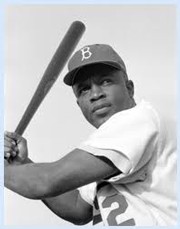From Aristotle to Aaron, History Class Explores Baseball's Cultural Roots

Jackie Robinson
Struck out looking.
That's a baseball phrase that might also apply to you if you saw the class roster for this fall and thought Radford University History Professor Johnny Moore's "Baseball and American Culture" class looked like an easy A.
There's no breezing through this class. There are no Eephus pitches to crank out of the yard.
Look it up.
If you don't put in the work and do the reading—there's a lot of reading—you have a better chance of catching up to a Justin Verlander fastball than getting a good grade in the professor's special topics class. Your average could slip below the Mendoza Line.
Again, look it up.
The 17 students or "citizens of baseball," as Moore calls them, borrowing a line from Ken Burns' 1994 documentary "Baseball," are more than likely aware of terms like "Eephus pitch" and "Mendoza Line" after a couple of months of class discussions and reading. For goodness' sake, there's a lot of reading.
Moore, a social historian, longtime baseball enthusiast and player (he hit .393 in an adult league this season), developed the class to give students a chance to learn more about the national pastime and dig deeper into the game's history beyond Babe Ruth, Baltimore Chops and box scores.
"I want them to embrace something that is fun but also has a scholarly and intellectual side to it," Moore said.
Baseball has a scholarly side? You bet it does. Students in Moore's class not only are reading the novel "The Natural" but also will delve soon into baseball and philosophy.
Wait. Are we mixing baseball and Aristotle?
"Yes," Moore said. "We have articles on Aristotle."
Baseball, the professor said, attracts intellectuals more than any other sport. "There's more to it than the interior of baseball, which is the statistics and the players and such. In the class, we talk about the social history of baseball, the meaning of baseball within the larger culture."
One of the most notable examples in relating baseball with the social history of the United States is Jackie Robinson, an African-American player who in 1947 broke baseball's color barrier as a member of the Brooklyn Dodgers.
"Jackie Robinson was extremely important to the history of our country," Moore said. "He came into the league a year to a year and a half before Army desegregation. He came into the majors seven years before Brown v. Board of Education, which desegregated schools. He was eight years before Rosa Parks refused to give up her seat on the bus."
Moore and his class go even further back into history, all the way back to the Civil War, discussing its importance to the growth of baseball around the country.
"The Civil War was incredibly important for the dissemination of baseball because a lot of people, especially in the South, who didn't know about baseball, learned to play during the war," Moore said. "When soldiers left to go back home after the war, they took the game with them."
Class discussions and readings—did I mention there's a lot of reading?—also include more recent topics, such as the steroid era of the 1990s and early 2000s, and women in baseball, Moore said, sporting a Colorado Silver Bullets T-shirt.
So, what's the most current topic in the baseball class? No, it's not whether Justin Verlander is dating model Kate Upton but rather a debate over the Washington Nationals' handling of Stephen Strasburg a year after the pitcher had Tommy John surgery.
And Moore, a longtime and long-suffering Chicago Cubs fan who has a pair of Roy Halladay's uniform pants framed on his office wall, like many of his students, disagrees with giving the ace right-hander a pitch count and cutting his season short in the middle of a pennant race.
"There were guys who pitched both ends of a doubleheader 100 years ago," Moore said, harkening back the game's long, rich history. "I bet those old pitchers are saying, 'Are you kidding me? We pitched 500 innings in a year, and this guy pitched 160.' I can just see them having this discussion sitting up in the field of dreams."
Look it up!